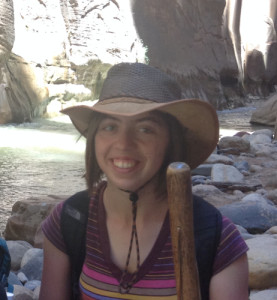Spotlight on Helen Wauck: HCI Researcher Studying Spatial Skills Training with Games
BLOG: Heidelberg Laureate Forum

Meet Helen Wauck, first to be featured in a series about some of the women young researchers attending this year’s Heidelberg Laureate Forum in September 2016.
Helen is a PhD student at the University of Illinois Urbana-Champaign, where her work centers on human-computer interaction. Her research, as she explains it, is on the cognitive side of a rather broad field.
I study how to use video games to train spatial skills. Spatial skills are crucial for success in STEM disciplines, so figuring out the best way to train them is very important for lowering the barrier to entry into these fields, especially for populations that typically have lower spatial skills, such as women and ethnic minorities. Some existing commercial games are very effective at training spatial skills (Portal 2 and Tetris, for example), while others, including cognitive training games like Lumosity and Dual N-Back, are completely ineffective. The goal of my research is to determine what specific game features contribute to the effectiveness of a video game for spatial skill training.
Helen’s proudest accomplishment so far was to win the “United States’ National Science Foundation’s Graduate Research Fellowship (NSF GRF), a prestigious fellowship that grants recipients three years of generous funding and international research opportunities.” The application process included a proposal for a multi-year research project, and despite not winning the award the first time she applied, she worked hard and won the second time around. As Helen says, “It’s really encouraging that not only my advisor but the NSF has faith in my ability to carry out this research topic and that it’s worth researching.”
Of course, life as a graduate student hasn’t been without its challenges. For example, Helen attended a liberal arts college and therefore took fewer computer science courses than many other undergraduates would have. At first, this left her feeling like a second-class citizen in her graduate program, but over time she came to realize that, in fact, everyone has come from wildly varying backgrounds. Even better, she eventually saw how her multidisciplinary background gave her an edge when it came to communicating her research effectively.
Like all participating young researchers, Helen is very excited for her upcoming trip to HLF:
I’m very excited to meet the other young researchers from around the world and hear about their experiences in their programs. Human-Computer Interaction is a very different field from many of the more systems- and math-oriented computer science subfields. The perspectives I get from researchers coming from all sorts of different backgrounds in computer science and mathematics will be very different from the perspectives I usually have access to in my field, especially given the heavily international nature of the HLF. I hope to meet lots of fellow researchers whose experiences can give me new insight into how I might direct my own graduate school experience, and who I can hopefully maintain contact and friendships with after the conference is over! I’m also very curious to hear this year’s laureates speak about their research process and how they overcame the challenges that were thrown their way; it’s so rare to have an opportunity to meet these incredibly successful researchers face-to-face and hear their personal stories.
Congratulations on your accomplishments, Helen, and we look forward to meeting you in September!
Stay tuned to meet other young researchers, a special post about mentors, and the advice our featured women want to share with others.



Thanks for Information about Internet Marketing. Your Article is impressive and very informative. I am now regular visitor of your website and bookmarked it.
Once again I would like to point out that the Blog is absolutely fabulous!
The news is very interesting thank you very much for the information ..